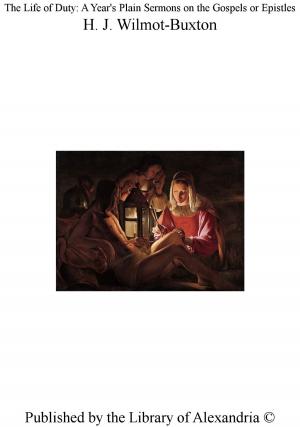Modern Skepticism: A Course of Lectures Delivered at the Request of the Christian Evidence Society
Nonfiction, Religion & Spirituality, New Age, History, Fiction & Literature| Author: | Charles John Ellicott | ISBN: | 9781465597748 |
| Publisher: | Library of Alexandria | Publication: | March 8, 2015 |
| Imprint: | Language: | English |
| Author: | Charles John Ellicott |
| ISBN: | 9781465597748 |
| Publisher: | Library of Alexandria |
| Publication: | March 8, 2015 |
| Imprint: | |
| Language: | English |
All things are full of God, said the father of Greek philosophy. "We have no need of the hypothesis of God," said a modern French astronomer. It is with the latter saying, which is descriptive of the attitude of modern science at this time, that the present address will have to do. Atheism no doubt exists; but far more common is the mode of thinking which would dispense with all questions about the Divine nature in dealing with the world and its phenomena; which considers that the introduction of the name of God into scientific research, complicates what is simple, obscures the rules of observation, introduces controversies that are useless to science, restrains the free course of inductive reasoning by an apprehension of consequences, and entangles physical inquiry which leads to sure and clear results, with mental and with spiritual inquiry which have produced nothing but disputation. Those who hold such views would think it unphilosophical to deny, just as they would regard it to affirm, the existence of God. But the popular mind is not equal to nice distinctions; and it seems almost the same thing to most people to deny the existence of God as to exclude the thought of Him when exploring His creation. I am not without hope that a few words delivered here upon "the argument from design," as it is called, may tend to diminish the growing estrangement between science and religion, and at the same time to revindicate for religion her legitimate share in matters of scientific interest. I may undertake that the subject, however unworthily treated in other respects, shall be discussed without bitterness, and with a fitting respect for those who have done so much for physical science during the present generation. It is necessary to sketch in a few sentences that field of creation with which the argument from design has to do. The world presents to us four kingdoms or classes of facts. One of these, and the first in point of order, is the mineral kingdom. A few so-called elements, as metals, earthy bases, and the like, acted upon by certain forces, known to us as gravitation, motion, heat, electricity, magnetism, chemical affinity, have formed the mountain and the valley, the wind and the clouds, the sea margin and the cave; in a word, all the grand substructure on which the higher kingdoms are to take their places.
All things are full of God, said the father of Greek philosophy. "We have no need of the hypothesis of God," said a modern French astronomer. It is with the latter saying, which is descriptive of the attitude of modern science at this time, that the present address will have to do. Atheism no doubt exists; but far more common is the mode of thinking which would dispense with all questions about the Divine nature in dealing with the world and its phenomena; which considers that the introduction of the name of God into scientific research, complicates what is simple, obscures the rules of observation, introduces controversies that are useless to science, restrains the free course of inductive reasoning by an apprehension of consequences, and entangles physical inquiry which leads to sure and clear results, with mental and with spiritual inquiry which have produced nothing but disputation. Those who hold such views would think it unphilosophical to deny, just as they would regard it to affirm, the existence of God. But the popular mind is not equal to nice distinctions; and it seems almost the same thing to most people to deny the existence of God as to exclude the thought of Him when exploring His creation. I am not without hope that a few words delivered here upon "the argument from design," as it is called, may tend to diminish the growing estrangement between science and religion, and at the same time to revindicate for religion her legitimate share in matters of scientific interest. I may undertake that the subject, however unworthily treated in other respects, shall be discussed without bitterness, and with a fitting respect for those who have done so much for physical science during the present generation. It is necessary to sketch in a few sentences that field of creation with which the argument from design has to do. The world presents to us four kingdoms or classes of facts. One of these, and the first in point of order, is the mineral kingdom. A few so-called elements, as metals, earthy bases, and the like, acted upon by certain forces, known to us as gravitation, motion, heat, electricity, magnetism, chemical affinity, have formed the mountain and the valley, the wind and the clouds, the sea margin and the cave; in a word, all the grand substructure on which the higher kingdoms are to take their places.















